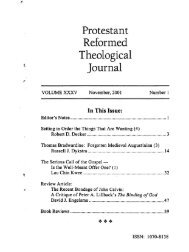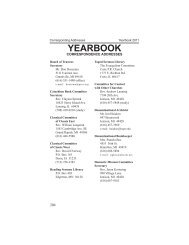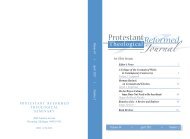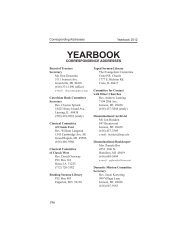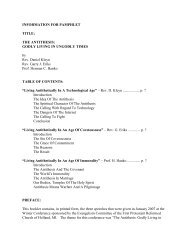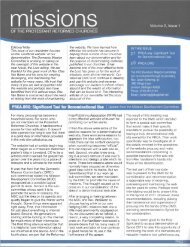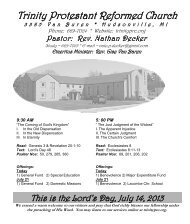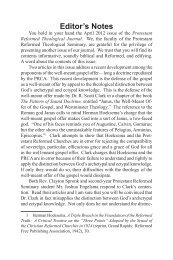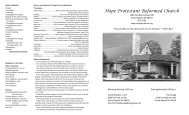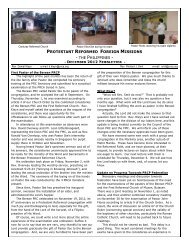November 2007 - Protestant Reformed Churches in America
November 2007 - Protestant Reformed Churches in America
November 2007 - Protestant Reformed Churches in America
Create successful ePaper yourself
Turn your PDF publications into a flip-book with our unique Google optimized e-Paper software.
<strong>Protestant</strong> <strong>Reformed</strong> Theological Journal<br />
sem<strong>in</strong>aries do not require the <strong>in</strong>excusable. Worse, he contends<br />
biblical languages for the div<strong>in</strong>ity<br />
that the neglect of the bib-<br />
degree, and many do not lical languages puts those who<br />
teach them at all, especially as are guilty of this neglect <strong>in</strong> jeopardy<br />
regards the language of Hebrew.<br />
of los<strong>in</strong>g not only a dist<strong>in</strong>c-<br />
Some theological schools have tive feature of the Reformation,<br />
retreated to the po<strong>in</strong>t of teach<strong>in</strong>g<br />
but of the heritage of the Reforl<strong>in</strong>e<br />
the biblical languages onmation<br />
itself. “We need pastor-<br />
or simply offer<strong>in</strong>g a ‘tools’ scholars, men like Calv<strong>in</strong> and<br />
approach” (p. 79). At the same those whom he tra<strong>in</strong>ed, to stand<br />
time, it seems to be rare that up and guard the sacred deposit<br />
m<strong>in</strong>isters keep up their language that has been left to our charge”<br />
skills after graduat<strong>in</strong>g sem<strong>in</strong>ary (p. 84).<br />
and enter<strong>in</strong>g the m<strong>in</strong>istry. The This is a f<strong>in</strong>e book, a book<br />
m<strong>in</strong>ister often uses the excuse that this reviewer wholeheartedly<br />
that he is too busy to take the<br />
recommends. The thesis of<br />
time to labor with the orig<strong>in</strong>al the book regard<strong>in</strong>g the Reformer<br />
text <strong>in</strong> sermon preparation, and<br />
John Calv<strong>in</strong>’s estimation<br />
congregations and consistories and use of the biblical languages<br />
do not always see the importance<br />
is well-documented.<br />
of it. “Preachers today The plea of the author is timely.<br />
often proudly say that they One can only hope that <strong>Reformed</strong><br />
never make use of the language<br />
and Presbyterian semi-<br />
skills they acquired <strong>in</strong> sem<strong>in</strong>ary naries and m<strong>in</strong>isters will respond<br />
– hav<strong>in</strong>g heard some of them<br />
positively to the plea.<br />
preach, I have no doubt that they Currid is right. Reta<strong>in</strong><strong>in</strong>g the<br />
are tell<strong>in</strong>g the truth!” (p. 83). biblical languages is <strong>in</strong>exorably<br />
This situation <strong>in</strong> <strong>Reformed</strong> bound up with retention of our<br />
and Evangelical sem<strong>in</strong>aries and Reformation heritage. ■<br />
among m<strong>in</strong>isters, Currid f<strong>in</strong>ds<br />
94<br />
Vol. 41, No. 1



